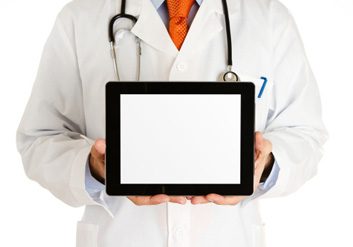
Smart rooms
Smart hospital rooms are in use in some hospitals in the U.S., such as Fisher-Titus Medical Center in Ohio. A digital message board outside the door lists patient allergies and other alerts. Staff scan their ID upon entry, prompting their name and photo to appear on the clinical dashboard inside the room. Bedside medical devices such as blood pressure monitors transmit data directly to the wall-mounted screen containing the patient record. Patients are given a wireless keyboard for an interactive TV where they can order movies, play music, surf the web, access meal menus, see information on their care team, view their medications or read educational information on their condition.

Palm-size diagnostics
An ultrasound that fits in the palm of your hand? Dr. Philippe Rola, co-founder and president of the non-profit Critical Care Ultrasound Institute, medical director of the ICU at Santa Cabrini Hospital in Montreal and part of the ICU teams at Humber River Regional Hospital and Scarborough General Hospital in Toronto, uses a portable hand-held ultrasound unit the size of a smartphone. “It’s pretty cool. I know of no one else using it yet, but it will spread soon enough.”

Smart condos for seniors
In 2011, the University of Alberta and Glenrose Rehabilitation Hospital in Edmonton used IBM technology to study volunteers living in a self-contained suite that was outfitted with sensors to capture heart rate, body weight, electricity consumption and use of doors, light switches and appliances. The information will help design living spaces for the elderly where software will provide alerts if a patient falls, is inactive for a long period of time, or has not taken medication as needed.

“Serious gaming” Technology
This is the application of gaming technology to more serious pursuits such as health care. Imagine you are scheduled for surgery. An automated phone message will remind you to fast and direct you to an online tour as an avatar so you can learn about your surgery. After discharge, you log in to talk with your care team, or chat with other patients. This software, designed by Avaya, is being used in Canada and worldwide as a virtual classroom for training paramedics, firefighters and other health personnel. “We expect this will be in use for patients in Canada in the next couple of years,” says Laurence Beaulieu, a client consult with Avaya Healthcare in Ottawa.

Computers as physician assistants
What if you had a specialist who knew the case histories of every patient with your symptoms, had read every medical journal article on the subject and memorized the latest research about your condition. Impossible? Maybe not. In February 2011, an IBM computer known as Watson won first place on TV’s Jeopardy!, beating two human champs (the $1 million prize was donated to charity). Since then, Memorial Sloan-Kettering Cancer Center in New York has been working with IBM on applying Watson to the field of oncology.
Watson is actually a natural language system or plain language computer, meaning it is not a search engine, but can understand the meaning of words when presented with questions and can point to specific evidence to support its recommendations. It will use its vast knowledge of case histories, clinical information and published research to advise a select group of oncologists on diagnoses and treatment options for cancer patients. “Watson does not make the decisions-the final decision is human-but Watson can help physicians make better decisions,” says Dr. Martin Kohn, chief medical scientist, IBM Research with IBM in New York.
Who knows? Perhaps one day we will all have our own personal Watson.
Related:
• 5 inspiring women who are changing global health
• Are medical wait times in Canada too long?
• Canada’s best medical care for women
